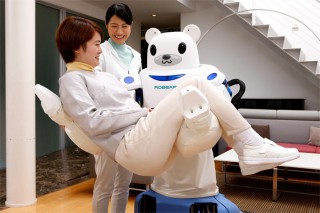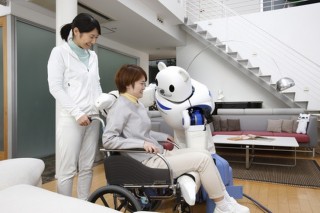Loading
Search
▼ Giant robotic teddy bear: Japan's nurse of the future
- Category:Other

CNET
The population of Japan is ageing, and fewer children being born. This creates a variety of problems -- not the least of which is a shortage of caregivers for the elderly, as the elderly population grows while the younger population shrinks. To help compensate, the country has been exploring a different solution: robots.
In the case of research institute RIKEN, cuddly teddy bear-faced robots that can lift and carry a mobility impaired patient, or help them stand and provide a support to lean on while walking.
ROBEAR is actually the third iteration of the bear-faced bots, the first and second of which were named RIBA and RIBA-II respectively -- although none have arrived on the market yet.
"The polar cub-like look is aimed at radiating an atmosphere of strength, geniality and cleanliness at the same time," research team leader Toshiharu Mukai told AFP. "We voted for this design among options presented by our designer. We hope to commercialise the robot in the not-too distant future."
ROBEAR makes several improvements on its predecessor, RIBA-II. It's much lighter, weighing 140 kilograms to RIBA-II's 230 kilograms, and has a smaller base, making it more compact and manoeuvrable.

It's also had an internal upgrade, with low gear ratio actuators that allow the joints to move with speed and precision. This also allows backdriveability -- the force encountered by the actuators is driven back into the system, which makes the movement softer and smoother.
Three types of sensors allow the robot to be gentle, too: Smart Rubber capacitance-type tactile sensors and torque sensors allow the robot to "feel", which means the robot can lift patients without hurting or endangering them.
"As Japan is ageing with fewer children, the problem of a shortage in caregivers for the elderly is getting serious. Expectations are high that robotics will help resolve this problem," Riken said in a statement.
Mukia added, "We really hope that this robot will lead to advances in nursing care, relieving the burden on care-givers today. We intend to continue with research toward more practical robots capable of providing powerful yet gentle care to elderly people."
- February 27, 2015
- Comment (0)
- Trackback(1)

